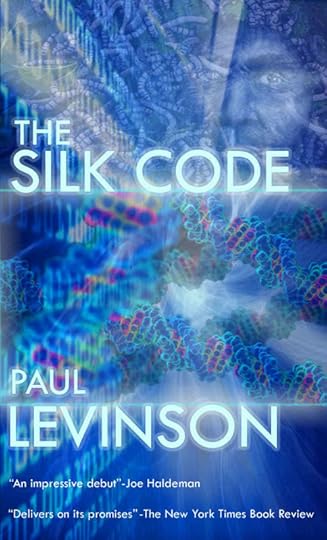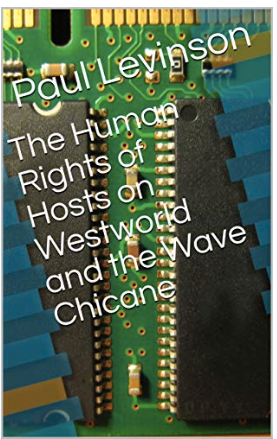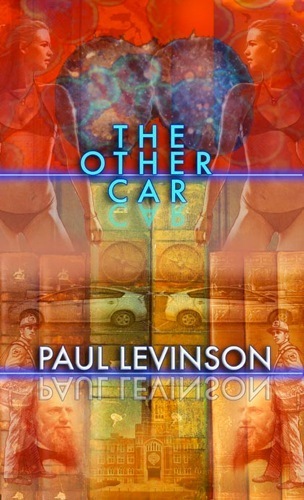Paul Levinson's Blog: Levinson at Large, page 111
December 9, 2020
Pictures on the Phone: Demo of Brand New Song
December 7, 2020
Your Honor 1.1: Taut Set-up

Your Honor debuted on Showtime on Sunday, with about as tight a set up as you're likely to find in a limited (ten-episode) cable TV series.
Here's what that is: Bryan Cranston plays a tough judge in New Orleans, a widower, with an asthmatic teenage son who goes off to lay a wreath at the site of his mother's death a year earlier. He's upset, takes his eyes off the road to get his inhaler, and hits another teenage boy riding on the new motorcycle his parents bought him for his birthday. Adam Desiato (the judge's son) tries unsuccessfully to revive the motorcyclist. He leaves without calling the police, tells his father (Judge Michael Desiato) what happened, and the judge decides the best thing to do is to bring his son into the police. Until the judge discovers that the slain boy is the son of one of the most vicious mobsters in the ward (or whatever exactly they call boroughs in the New Orleans). Not only that, but this boy's father is played by Michael Stuhlbarg.
So, we not only have a confrontation of good vs. evil -- or maybe, morally ambiguous vs. evil -- but the two sides are portrayed by two powerful actors. Hunter Doohan as Adam is impressive too, as is just about everyone who opens their mouth in this taut, provocative start of a story. The best kinds of conflicts, from a narrative standpoint, are those in which the two sides are evenly matched in terms of passion and justification for their position. The judge wants to save his son. The mobster wants to avenge his son. Both are determined their goal will be achieved. Nothing will stand in the way of either.
In one sense, Jimmy Baxter the mobster has the upper hand. He's already a killer, and accustomed in the ways of doing this. In contrast, His Honor, Judge Desiato, is used to following and interpreting the law. But he'll do anything to save his son, and that no doubt is exactly what he'll have to do.
An excellent set-up, as I said, and I'll be back here next week a report on how it goes.

Paul Levinson's books ... Paul Levinson's music
Mank: Elusive Truth

I've had an abiding interest in Herman Mankiewicz and Orson Welles since I first saw Citizen Kane and devoured Pauline Kael's Raising Kane in an MA in Media Studies class I was taking at The New School in 1975. Welles became such a passion that I devoted one of my Ian's Ions and Eons stories ("Ian, George, and George") to Welles (George actually was his first name, and Orson his middle name) and I even talked about his work in this History Channel interview in 2010:
I've had less opportunity to talk about Mankiewicz, but pleased to discover that his son Frank was Robert F. Kennedy's 1968 Presidential campaign press secretary, and his grandson Josh (son of Frank), a local New York City television and now a national NBC reporter. I was therefore glad to see Mank on Netflix last night.
I thought it was good but not great. The black-and-white, flashback format was a nice, if somewhat obvious, homage to Citizen Kane. Herman's writing of the script, with no credit but ample payment from Orson, at first, and then Herman insisting on getting credit, because he realized the impact the movie would have, was also well presented. But the probing, enduring questions around the creation of this masterpiece were barely touched upon and not extensively explored. What was Herman's ultimate motivation in writing such a devastating take-down of his friend and patron William Randolph Hearst aka Charles Foster Kane? Did Herman love Hearst's young wife Marion Davies, platonically but nonetheless deeply enough to motivate the script?
And speaking of Davies, when Herman's brother Joe asks Herman about the "rumor" that "Rosebud" was Hearst's name for Davies' "genitalia," Herman scoffingly denies it. Was that denial truthful (which it appeared to be in the movie) or just Herman not wanting to admit the truth to his brother?
The problem is that, since presumably almost no one in the audience for Mank knows what really happened, and why, we have no way of judging the accuracy of this docu-drama. That's ok. I often tell my students that you can't expect complete truth even in documentaries, let alone docu-dramas. But because that elusive truth of such keen interest, I found Mank enjoyable -- and certainly lifted by Gary Oldman's brilliant performance in the title role -- but somewhat unsatisfying.
Paul Levinson's books ... Paul Levinson's musicDecember 5, 2020
Virgin River: The Scenery, the Food, The Acting, and the Story

So my wife and I just finished binge-watching the two seasons of Virgin River on Netflix. What was I doing watching so much of a romantic drama that takes place in a beautiful town in the woods near the river of the title in northern California? Well, it does have a big dollop or more of crime in it, and criminal fiction is my second favorite beat, after science fiction which is my first. But that's not why I watched these two seasons.
The reason is I really liked this story of Mel, a nurse practitioner, who goes up to Virgin River, after her husband is killed in a car accident in Los Angeles. There she finds Jack's Bar, which is actually a restaurant owned and run by Jack, and a cast of effervescent characters including the mayor, Hope, and her estranged husband, Doc, a doctor. Hope is played by Annette O'Toole (great to see her on the screen again) and Doc Mullins by Tim Matheson. They're not the only ones who put in a great job of memorably portraying idiosyncratic characters. Jack is well played by Martin Henderson, whom my wife remembers and liked from Grey's Anatomy, and Mel by Alexandra Breckenridge, whom my wife likes in This Is Us. I've never seen either before, but both are excellent in Virgin River, especially Breckenridge, who does a fine job with the conflicting emotions that Mel is confronting and juggling.
Why else did I like Virgin River so much? The scenery is a real tonic after being locked down for almost three quarters of a year. Even the food in Jack's restaurant looked really delicious, probably for the same reason. I'd go out with my wife in a heartbeat to any restaurant where Preach was cooking, and he was well played, too, by Colin Lawrence.
So hey, if you miss cabins in the woods near a river on your summer vacation, or even just some great food in a restaurant that pops up on your trip, check out Virgin River. And be prepared, as well, for a compelling story that will keep you in your seat for as many days as it takes.

Paul Levinson's books ... Paul Levinson's music
December 3, 2020
Archive: Androids with Twists

They've been at least three excellent, sometimes outstanding, TV series that probe the philosophic and emotional complexities of androids in the past few years, Westworld, Humans, and recently Raised by Wolves. But I can't think of an equivalent movie. Or couldn't think of one. Until Archive, which has been streaming on Amazon Prime Video since the summer, but I just got around to seeing earlier tonight,
The set-up we've seen in all manner of science fiction and horror movies in the past century: a bereaved husband, who is a genius in AI or other suitable science, determined to use his genius to bring back his deceased wife. What makes Archive worthy, even great, then, is not in this common set-up. It's its execution.
Theo's the genius who's lost his wife Stacy in a car crash. Fortunately, he got a bit of her self (or mind, soul, personality, take your pick), encoded in some kind of digital drive while she was well and alive --- aka the "archive". Being the genius that he is, and the time about 20 years in our future, Theo is able to build this bit of self into a complete digital persona. Next step is to put her into an android who looks, talks, thinks, feels like Stacy because, in a very real sense, she actually is.
The stage or story is thus set in two important dramatic ways. Theo didn't build and therefore doesn't own the archive technology. So we have corporate conflict. And Theo can't build a new Stacy first crack out of the box. On the way to Stacy, Theo builds an android with the mental age of a young child, and another with the age of a young teenager. The sibling jealousy and rivalry between the teenaged android and the emerging Stacy, along with Theo's patermal discipline and toleration of the teenager are done just right, and would've been worth the price of admission had Archive been shown as intended in theaters.
There are, in effect, two surprises near and at the end of this fine movie. I'll tell you some about the first but not the second, just in case you haven't seen Archive prior to reading this. The "Stacy" that Theo is constructing has a personality at least a little different from the original. Turns out that this new she -- the personality -- was a test-run that Theo got going to make sure the digital entity in the archive could meld well in the bio-digital android he was constructing. But the new "she" is not exactly the same as Stacy. So Theo's plan is to swap Stacy's mind into the android, which would mean the new "she" would cease to exist. The ever-courteous Theo apologizes to the new "she" right before he initiates the transfer and--
Ok, that's where I'll stop in the recounting. I will say that there is an even bigger surprise at the very end, and that's the part I liked least in this otherwise outstanding movie (written and directed by Gavin Rothery, in his feature length debut). Bur see it yourself, and let me know if you agree.

They're coming out into the open, for the first time in centuries ....

Paul Levinson's books ... Paul Levinson's music
Podcast Review of The Queen's Gambit
Welcome to Light On Light Through, Episode 161, in which I review The Queen's Gambit, reported today (3 December 2020) in The Hollywood Reporter as "atop the Nielsen streaming chart" for the second week in a row.
Further reading: my blog post review of The Queen's Gambit
Paul Levinson's books ... Paul Levinson's music
December 1, 2020
Big Sky 1.3: "You Kidnapped the Wrong Girls"

Well, that was the best line in tonight's episode 1.3 of Big Sky -- "You kidnapped the wrong girls" -- said by The Big Rick (title of the episode) to Ronald, after Rick retrieves Grace, with two arrows in the leg, after Grace escapes and almost makes her escape good, by getting a fisherman to help before Rick shoots him dead -- with an arrow.
In Big Sky, just about everyone is bad ass -- which leads to good drama -- with the exception of Ronald, who can't do much other than taze the girls every time they attack him and try to escape. When you add to that Jenny and Cassie, who are pretty tough, too, you have a pretty unevenly matched situation: five tough women against one tough man.
How has Rick managed to succeed, at least so far? Mainly cause he's a state trooper, and not considered a bad guy by anyone, except by Cassie and maybe his wife, at first. But by the end of this episode, Jenny has joined Cassie in her misgivings about Rick, so there may be some hope for the kidnapped women after all.
At this point, I gotta say that Big Sky is moving along a little slowly for my tastes. Rick emerged as the villain at the end of the debut episode. All the pieces were set at that point. And though the two episodes that have followed were each exciting, the pieces on the board are still all, essentially, in the same place. I'd have much rather seen Grace still at large at the end of this episode.
There are seven more episodes in and under Big Sky. I'm hoping that sooner rather than later the narrative will break out of the relatively small container that it finds itself in. Not to mention those three brave kidnap victims.
See also Big Sky 1.1: A Pretty Big Deal ... Big Sky 1.2: The "Goods" and the Ruined Plan
His Dark Materials 2.1-3: Dust, Dark Matter, and Multiple Universes

Back with a review of the first three episodes of the new second season of His Dark Materials on HBO. I liked them a lot, and thought that, in a variety of ways, these episodes moved the series a bit from high fantasy to steampunk on the genre dial. A good thing, in my book. (And speaking of books, I'll mention again that I haven't read any of Pullman's novels.)
Multiple universes or alternate worlds have become an increasingly important subset of science fiction. One of the best novels I've read in years was the late J. Neil Schulman's The Fractal Man, a kaleidoscope of alternate worlds right here on Earth in our own time. In His Dark Materials, Season 2, Lyra travels from the universe we saw last year, to one which is more like ours. Smartphones, computers, and the like are in ample evidence in Cittàgazze, and play essential roles in the story. But "Spectres" which turn adults into zombies are also on hand, and make this more-Earth-like alternate world markedly different from ours.
The computers signify a more scientific bent in this new world. Lyra discovers that dark matter -- known in this alternate world as well as the world we all now inhabit, in which we can watch His Dark Materials on the screen -- is the equivalent of the dust we have all come to know by virtue of the first season. Lyra now has a great vehicle for understanding what she needs to understand in order to save herself and all of these worlds.
It's good that she's joined in her often desperate adventures by Will, who understands at some of the workings of Cittàgazze. They're just friends, at this point, but there's a chemistry that will likely move them closer than friends as the story progresses. Mrs. Coulter is in good form, meting out cruelty as necessary but ultimately unwavering in her love for Lyra and her need to protect her.
All in all, His Dark Materials occupies a unique niche of sheer fantasy ala Lord of the Rings and some kind of steampunk as in The Difference Engine, and it's most enjoyable to see.
November 30, 2020
Podcast Review of The Undoing (entire season)
Welcome to Light On Light Through, Episode 160, in which I review the just-concluded limited series on HBO, The Undoing.
Paul Levinson's books ... Paul Levinson's music
November 29, 2020
The Undoing Finale: Hiding in Plain Sight

My wife thought it was Jonathan. She kept coming back to why did he leave town if he wasn't reeling from the killing. But I bought his argument that he was traumatized by coming back and finding the bludgeoned body. That was close to the truth. Jonathan did try to leave after smacking Elena against a wall. And Elena ran after him with the anvil, and Jonathan took it from her and killed her. So Jonathan's story was close to the truth, except he left out the all-important fact that he killed her.
Although this ending was somewhat surprising, since Jonathan was presented as the obvious suspect, wrongly accused, I have to say that hinging the surprise a story on a murderer's convincing performance of innocence, in pretty much scene after scene, is not my favorite ending to a whodunnit. Maybe I don't get out enough in the world, but I find it a little hard to believe that Jonathan, any murderer, could have been so cool, upset, and convincing.
And one other nitpack: I thought that Haley, who had been shown as nothing but brilliant and tough up until that final court scene, got rolled over a little too easily. Wouldn't someone of her calibre had a least a few tricks up her sleeve when things started going so badly in the courtroom?
But all in all, a riveting little series, with tour de force performances by everyone, down to and especially in that last harrowing gambit on the road with father and son.
See also The Undoing 1.1: A Murder, A Missing Person, and NYC Bustling in the Snow ... The Undoing 1.2-3: A Dearth of Likely Suspects ... The Undoing 1.4: Three Great Scenes with Sutherland ... The Undoing 1.5: The Algorithm, the Waiter, and the ...

Levinson at Large
- Paul Levinson's profile
- 340 followers






